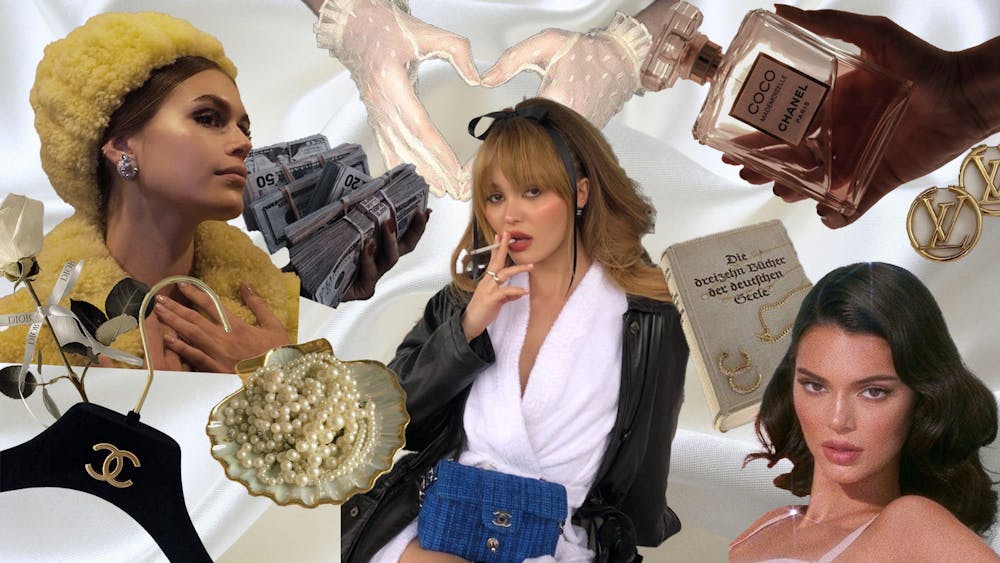“It–girls” like Lily–Rose Depp, Maude Apatow, Bella Hadid, Kendall Jenner, and Kaia Gerber all have one thing in common: their enormously successful relatives. Numerous TikTok posts have been dedicated to making fun of these “nepotism babies,” but they have also been idolized through edits of people’s favorite “nepo girls.” Their effortless style, automatic fame, associations with other celebrities, and linear path to success have led many to wish for the nepo baby lifestyle.
As the nepo baby aesthetic—which is rooted in elitism and exclusivity—grows in popularity among the younger generation, so do conversations about wealth inequality and the unattainability of the American Dream. In fact, “eat the rich” is an often–uttered phrase among Gen–Z, even by those with money. But despite the outward dislike of everything elitist, our chosen aesthetics and it–girls say the opposite.
The trend of idolizing those who have benefited from nepotism in the industry reveals how what used to be an accusatory insult is arguably now an aesthetic of its own. In many ways, the internet’s fascination with nepo babies mirrors the fervor over the “old money” aesthetic. The old money aesthetic is pitted against “new money,” which supposedly lacks the sophistication and quiet coolness of wealth passed through generations.
Though most nepo babies are considered new money, the idea behind the nepo baby ideal and the old money aesthetic is the same—when your wealth has been inherited, it looks more “authentic.” And when wealth looks more authentic, it becomes more coveted. As the saying goes, money talks, but wealth whispers. The nepo baby lifestyle is completely out of reach for most of us, but that’s likely why it’s so widely discussed and dissected.
As Adolescent magazine writer Sophia Peyser points out, Gen–Z’s obsession with wealth as an aesthetic is antithetical to what (most of) our generation stands for socially and politically. “By dreaming of belonging to that exclusive, privileged, greedy world, we’re justifying it,” she writes. Having wealth or connections passed down from generation to generation is a privilege overwhelmingly reserved by white people, and unsurprisingly, most nepo baby icons are white.
Nepotism in Hollywood goes deeper than the likes of model it–girls such as Kendall Jenner or Bella Hadid—many seemingly "up–and–comers" or "innovators" in the industry have been helped along by their parent’s connections. For example, Euphoria’s Sam Levinson is the son of an Oscar–winning director, indie icon Billie Eilish is the daughter of actress Maggie Baird, and Dakota Johnson comes from a family of famous actors.
Nepo babies often have the ability to pay for lessons and other training that the average person couldn’t afford. Expensive trips around the world are what create that worldly, unique “it factor” that all nepo baby icons are so heavily praised for. In short, wealth—not innate coolness—is what makes it–girls coveted.
Idealizing nepotism reinforces the notion that meritocracy isn’t the backbone of a fair and inclusive industry. Despite diversity in Hollywood being an issue that our generation always seems to be fighting for, the number of nepo babies put on a pedestal further increases the barriers to entry in show business. Despite people of color continuing to face issues with being typecast or getting roles at all, even in spite of prominent movements like #OscarsSoWhite, predominantly white nepo babies flourish due to prior connections and already–existing wealth and resources. While our generation claims to want to "eat the rich," we further their success through our fixation on nepo babies and it–girls. It seems as if the only way to be "cool" in Hollywood is to be wealthy.
So many stars have built their name on “authenticity” and realness, even though they were born with a golden ticket right into the industry. That’s not to say all nepo babies are untalented, because many genuinely are. But at the end of the day, it can’t be ignored that their families helped them get where they are today. Recognizing the ills of nepotism won’t make it go away—but we can at least stop pretending it’s a good thing.

